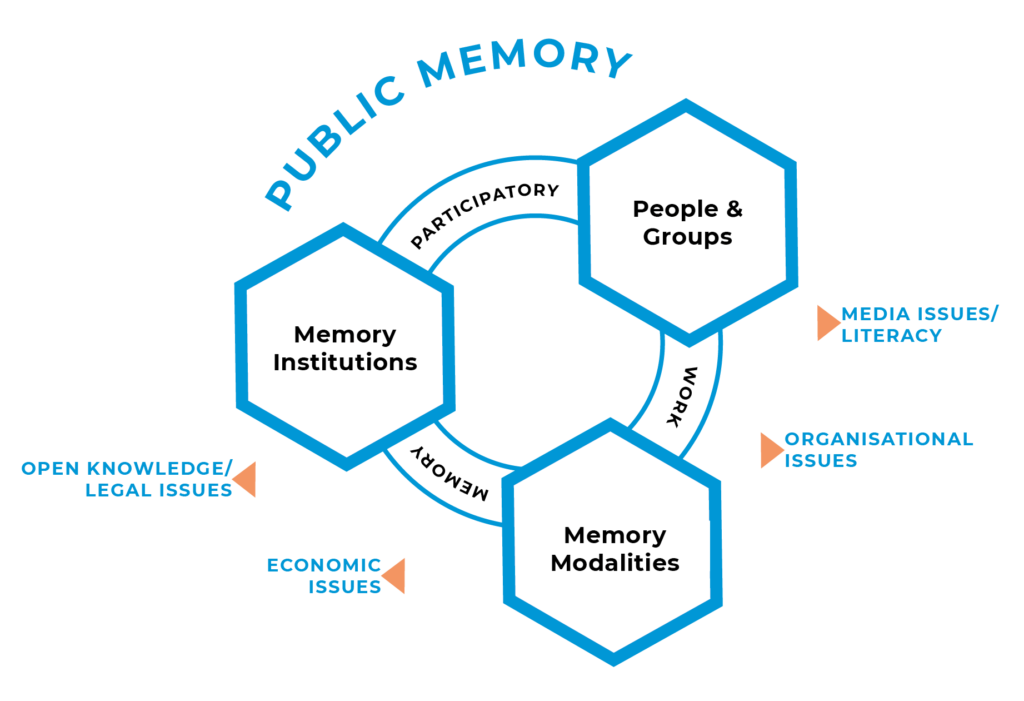Project Outline Horizon 2020 POEM
The ETN addresses the urgent need of experts in the heritage sector who are qualified for working with the mediatized memory ecology, the changing socio-technical, organisational, legal, economic, and ethical frameworks for the use of cultural materials. They will have the capacity to mediate between the stakeholder’s memory institutions, civil society, and creative and digital/IT industries for empowering people across Europe and for initiating future-envisioning creativity and innovation promoting socially inclusive memory practices.

Diverging forces across European societies – most visible in both the contemporary nationalist movements and Islamist radicalization – place particular relevance on social and cultural inclusion. Culture may cultivate both integrative and disruptive forces; in this light heritage experts, policy makers, social entrepreneurs, and other facilitators are seeking to establish inclusive memory politics for envisioning possible futures of how we should remember our past in Europe. The recognition of “difficult” and dissonant traditions and the contestation of public memory in respect to the representation of colonial traditions and immigration, multiculturalism and transnational history, non-Christian religious heritages in European societies, female heritages, or the inclusion of deprived groups are important issues in this debate. Being part of the public memory is crucial for envisioning positive futures, acknowledging people’s and groups’ history, identity, belonging, and membership. Furthermore, questions of eligibility play an important role in relation to public support or redemption, for partaking in economic outcomes, or in relation to questions on ownership of cultural heritage resources.
Participatory memory work (PMW) is a framework for examining the strategies and practices of public memory institutions – libraries, archives, and museums – as well as of individuals and groups in their everyday life. PMW means the inclusion of diverse memories across social situations (gender, socio-economic status, education, migration, etc.) into public memory work. It means to acknowledge these diverse memories as a significant part of the history, the heritage, and the contemporary life in Europe. Aiming for a socially inclusive public memory, concepts of European cultural citizenship are increasingly debated and experimented widely with participatory approaches in public memory institutions. At the same time, new memory ecologies have emerged with networked media infrastructures and their extensive uses, in mediatized, globally connected societies. The Internet and social media are “natural” parts of self-representation, marketing, or audience communication of public memory institutions; large scale digital heritage initiatives demarcate the transformation activities towards digital cultural production.
However, the participatory turn in memory work, essential for a socially inclusive public memory, turns out to be not as easy to implement in practice. Aside from the established memory institutions, people and groups explore Internet platforms for commemoration and sharing personal texts, photos, or videos and collaboratively contribute to an emergence of open access “archives” of everyday life. The diverse platforms, e.g. YouTube, Facebook, Twitter, Instagram, Pinterest, etc., broadly attract people and groups for contributing cultural materials, articulating their views of history/histories and enfolding personal and group-related memory practices. Even though they are public, these Internet “archives” are beyond the scope of public memory politics and institutions; they are run for economic purposes in private ownership. The accessibility of these “archives” is regulated by business models and remains unclear towards the future. Connecting personal and group-related memory work in the public to participatory memory politics is thus confronted with legal and economic obstacles, ethical issues, as well as with discontinuities and gaps of individual and institutional social practices of memory work. This highlights the changed technical, organizational, and legal modalities of doing participatory memory work for social inclusive memory politics.
The POEM ETN will address these challenges through excellent research providing robust knowledge for coping with these challenges in cultural policy, memory institutions, and civil society and through educating a new generation of experts for PMW who are capable of applying the new knowledge for inclusive future-oriented memory practices that contribute to social cohesion in Europe.
Newsletter
If you want to make sure you are up to date with POEM, please sign up to our newsletter. We will keep you informed on a regular basis via email of news from the European Training Network POEM, its partners, and projects.
Please be aware of the terms & conditions concerning data protection.
POEM
Coordination and Project Management
University of Hamburg
c/o: Institute for Anthropological Studies in Culture and History
Grindelallee 46 | postbox: H8 | 20146 Hamburg | Germany
+49 (0)40 42838-9940
Concepts, strategies and media infrastructures for envisioning socially inclusive potential futures of European Societies through culture.
This project has received funding from the European Union’s Horizon 2020 research and innovation programme under the Marie Skłodowska-Curie grant agreement No. 764859.

